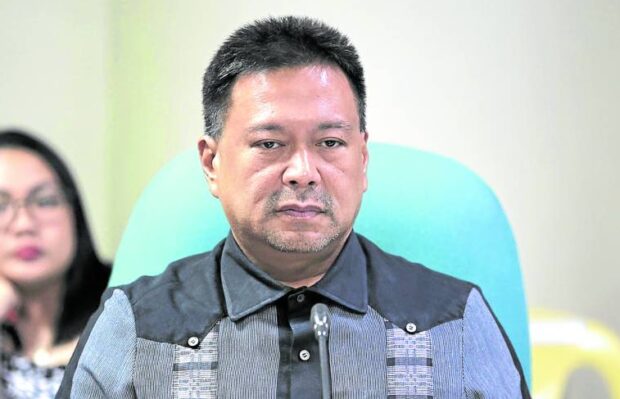MANILA, Philippines — Sen. JV Ejercito on Sunday urged the Senate blue ribbon committee to look into the “midnight gold rush” approval of 22 reclamation projects around Manila Bay.
Specifically, Ejercito questioned the authority of local government units (LGUs) to enter into contracts with private companies, many of which are owned by the Chinese government, to dredge and dump sand off the shores of Manila Bay.
“If we want to get to the bottom of these reclamation projects, all stakeholders and agencies concerned have to be summoned [to a Senate investigation],” Ejercito told the Inquirer.
The senator said he didn’t think then-President Rodrigo Duterte supported these reclamation projects. “Probably the people around him conspired to have these ‘midnight gold rush’ [deals] approved,” he said, without elaborating.
Ejercito said the blue ribbon panel, chaired by Sen. Francis Tolentino, should review an order supposedly issued by the Philippine Reclamation Authority that allowed local governments around Manila Bay to approve the reclamation activities.
The senator, who had also served as mayor of San Juan City for nine years, said any project involving properties owned by the state should be approved by national government agencies.
Possible overreach
During a Senate hearing last week, Public Works Secretary Manuel Bonoan said his department was not involved in the approval of the reclamation projects, thus the possible overreach by the LGUs.
“Is it proper for LGUs to award the contracts for the reclamation projects? From what I know, all bodies of water, including Manila Bay, are patrimonial assets owned by the state,” he also told radio dzBB’s Bantay Balita sa Kongreso.
“That’s why I don’t understand what happened here and why the LGUs were authorized to grant the contracts,” he said. “It’s one of the contentious issues here.”
Last week, President Ferdinand Marcos Jr. suspended all reclamation projects at Manila Bay pending a comprehensive government review.
This came days after the US Embassy in Manila raised concerns over the impact of these projects on the environment plus the involvement in the reclamation of a Chinese construction company that Washington had blacklisted three years ago.
According to Ejercito, individuals behind the approval of questionable projects should be held liable for “destroying” one of the country’s famous tourist spots.
The senator often cycles to the Senate building, located along the coast of Manila Bay in Pasay City.
“I used to enjoy the fresh air while riding my bike. Now, you will inhale sand (particles) because of the reclamation projects in Manila Bay,” he lamented.
Dredging activities
In November last year, Sen. Risa Hontiveros filed a resolution calling on the Senate to investigate reclamation activities not just in Manila Bay, but in other coastal communities as well.
International environmental group Oceana earlier said there were 52 ongoing reclamation projects across the country as of February.
Adding to these concerns are reports by Cavite fisherfolk that seabed mining has continued in different parts of Manila Bay for dump and fill projects, despite Mr. Marcos’ order suspending reclamation activities.
Speaking to the Inquirer, Pamalakaya chair Fernando Hicap said they saw at least five dredging vessels off Rosario, Noveleta, Tanza, and Naic in Cavite as of Sunday.
This was just four days after the President directed the review of reclamation activities in the bay.
Hicap said dredging activities should be covered by the suspension orders since they complement ongoing reclamation projects.
‘Twin evils’
The bay’s fisherfolk often refer to reclamation and seabed mining projects as the “twin evils” of the bay, as both destroy its corals and seabed.
In January, the Inquirer reported how the bay’s fisherfolk, especially in Bataan province, were seeing fewer fish since the projects started, as the noise and dredged-up sediment have also driven away fish from usually productive grounds.
“It seems they are still continuing mining the bay and exploiting a convenient loophole in Mr. Marcos’ orders,” Hicap said. “While it’s true that these are separate activities, dredging can only happen if there are reclamation activities.”
He reiterated their call for Marcos to issue an official executive order, or to marshal Congress to pass a law that would declare Manila Bay and other fishing grounds in the country as reclamation- and mining-free zones.
“Their effects on the bay and other fishing grounds across the country are already well-documented and fisherfolk are suffering for it,” Hicap said. “Unless Mr. Marcos gives weight to his declaration, these suspension orders will be toothless.”
